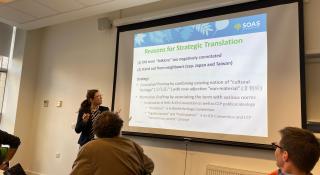
Breadcrumbs navigation
Global politics of cultural heritage: Status, authority, and geopolitics
Elif Kalaycioglu and Jelena Subotić discuss the key points from their new Review of International Studies (RIS) article. The article introduces the special issue on Global Politics of Cultural Heritage we have co-edited, forthcoming in Review of International Studies. It lays out the wagers of the special issue (SI), synthesises interdisciplinary work on heritage politics, and outlines three key facets of global heritage politics that the SI foregrounds. If you'd like to know more you can read the full article at - Global politics of cultural heritage: Status, authority, and geopolitics
Why should IR care about cultural heritage?
Heritage is a ubiquitous part of global politics. Highly publicised destructions of the Buddhas of Bamiyan, the Sufi shrines in Timbuktu, and the ruins of Palmyra have made global heritage politics visible. Beyond instances of destruction, heritage politics is at play in the People’s Republic of China’s recovery of the Silk Roads heritage in tandem with its Belt and Road Initiative (BRI). Heritage is further part of global politics through state pursuits of World Heritage listing, and postcolonial nations’ demands for artifact restitution.
There is, then, a disjuncture between the ubiquity of heritage in global politics, and the dearth of International Relations (IR) attention to it. We make three wagers for why IR should attend to global heritage politics:
- Heritage is a ubiquitous element of global politics, and deserves greater theoretical, empirical, and analytical attention from the field of International Relations (IR).
- Attending to heritage reveals further expanses of global politics. These expanses include unexpected spaces (museums, underwater dives, archery tournaments) where global politics play out, and the broad range of resources (ancient ruins, art objects, traditional sports) that are mobilised to global political ends.
- Heritage reveals a new source of authority that enables states and international institutions to make claims to power, status and control.
Interdisciplinary insights: Heritage, community, and politics
In urging IR to take heritage politics seriously, we acknowledge a rich corpus of interdisciplinary work on the subject. We synthesise the key insights of this body of work to illustrate why heritage is a productive and salient political domain, domestically and internationally.
Specifically, heritage sites are material carriers of abstract ideas. As such, they have been attached to various social purposes. Key among these purposes is the construction of communities around shared cultural and political histories. This construction unfolds through selective preservation of material sites and carefully curated, often officially steered, narratives. Heritage narratives regularly skip over ill-fitting sites and periods to construct smooth cultural histories. Finally, heritage narratives are made and remade from the present, and with its political concerns in mind.
With these potent political dynamics in mind, we can turn to the three facets of global cultural heritage politics that our SI highlights.
International status and prestige
IR scholarship has identified culture as a source of status and prestige. However, this role of culture has mostly been acknowledged in passing and not developed further. An oft-cited exception to this is Joseph Nye’s work on soft power, which involves the international projection of national attributes.
With sites and artefacts that evoke ‘golden ages’ of cultures and civilisations, if not humanity as a whole, heritage is a source of international status and prestige through the holdings of national museums or the designation of world heritage status.
Furthermore, the epistemic and institutional infrastructures of global heritage politics show that the construction of cultural status and prestige is not simply a matter of projecting national attributes internationally. International ideas of cultural value and competition shape national pursuits of cultural prestige.
Authorised by heritage
Heritage politics illuminates a greater range of actors who have authority in the conduct of global (cultural) politics, such as museums and cultural experts. This range emerges from the authorizing function of heritage politics, which expands the range of action for international institutions and states. These actions include making decisions on the value, ownership and protection of cultural sites and artefacts.
Geopolitics of heritage
Community building around heritage is not only a domestic endeavor. Field-shaping interdisciplinary work has illustrated how Silk Roads heritage is mobilized to foster international communities as heirs of a shared cultural history to serve present-day goals around the BRI. The SI extend these insights. It shows how geopolitics of heritage bring together competitive and community building dynamics and attends to the multi-scalar politics of heritage that unfold across domestic and international levels.
Contributions in brief
- “The 19th century ‘antiquities rush’ and the international competition for cultural status” by Jelena Subotić illustrates how the nineteenth century imperial competition between France and Great Britain shaped the politics of cultural acquisition. The massive collections produced by this status competition and held in national museums continue to mark the two countries as international cultural powerhouses.
- “World Heritage and inter/national cultural prestige” by Elif Kalaycioglu demonstrates how UNESCO’s world heritage regime generates a distinctly international form of cultural prestige that is nationally coveted. This prestige emerges from the stipulation that some sites possess outstanding universal value, constitute humanity’s shared heritage, and are more valuable than the sum of all national heritage. In seeking this international cultural prestige, states present themselves as homes to, custodians of, and contributors to humanity’s shared heritage.
- “Restitution of colonial heritage collections: Partial norm implementation in Belgium and the United Kingdom” by Franziska Boehme centers contemporary restitution politics and the authority that museums can exercise. Comparing Great Britain and Belgium’s uptakes of the emerging restitution norm, Boehme shows the role museums can play in artifact restitution despite political resistance.
- “Crimes against cultural heritage: World-building at the International Criminal Court” by Matthew Weinert turns to the International Criminal Court’s Policy on Cultural Heritage. Weinert traces the efforts to incorporate heritage protection into the Court’s mandate, which he argues deepens the ICC’s role as an ‘agent for humanity.’
- “The protection of cultural property in times of armed conflict: ethics, gender and coloniality” by Annika Bergman-Rosamond analyzes UNESCO’s military manual on heritage destruction to note the absence of communities of identification from the document. Bergman-Rosamond further flags a key ethical question, namely, the potential perils of militarized heritage protection.
- “Catharsis, rearticulation of desire and ontological insecurity: The case of Serbia’s attachment to Kosovo” by Filip Ejdus and Marina Vulovic track how a proposed land swap between Serbia and Kosovo generated renewed official attention to Northern Kosovo’s medieval Serbian heritage. They illustrate how present-day concerns shape heritage politics and analyze the local population’s skeptical reception of these efforts.
- “Heritage as power: History and tradition in constructing Brazil's far-right populism” by Deborah Barros Leal Farias and Guilherme Casarões show how Bolsonaro’s right-populist heritage politics stitched together Brazil’s monarchical and military periods to narrate it as a socially conservative Christian community. The authors note that this heritage narrative also addressed an international audience of like-minded, ethno-national states.
- “Heritage geopolitics: Hegemonic meaning-making, international orders, and the heritagisation of traditional archery in Turkey and beyond” by Fulya Hisarlioglu and Lerna K. Yanık trace official efforts to revitalize traditional archery in Turkey. These efforts similarly have both a domestic and an international audience. Juxtaposed to modern sports, defined as corrupt, the revitalization of traditional archery seeks to foster traditional communities at home and abroad.
Want to know more? You can read the full article at DOI: https://doi.org/10.1017/S0260210525101502
This particular article is open access, however BISA members receive access to RIS (and to our other journal European Journal of International Security) as a benefit of membership. To gain access, log in to your BISA account and scroll down to the 'Membership benefits' section. If you're not yet a member join today.
Photo by Maria Stewart on Unsplash


